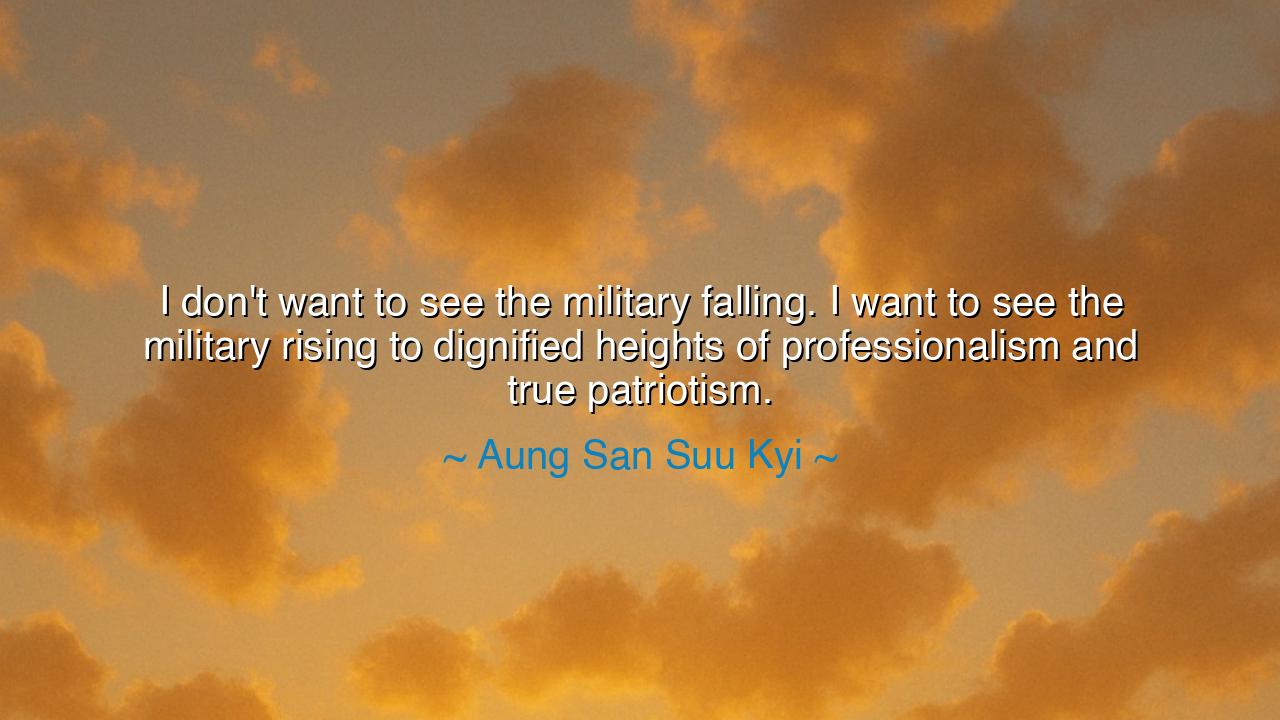
I don't want to see the military falling. I want to see the
I don't want to see the military falling. I want to see the military rising to dignified heights of professionalism and true patriotism.






The stateswoman and moral leader Aung San Suu Kyi once declared with unwavering conviction: “I don't want to see the military falling. I want to see the military rising to dignified heights of professionalism and true patriotism.” In these words lies a vision of profound ethical and civic responsibility. She recognizes that a nation’s strength is not measured solely by its armies, but by the integrity, discipline, and moral grounding of those who wield its power. True patriotism is inseparable from professionalism, honor, and service to the nation rather than self-interest or oppression.
In the eyes of the ancients, the might of the soldier was always paired with virtue. The Greeks and Romans revered the warrior who fought not for personal gain or vanity, but for justice, the laws of the land, and the welfare of the polis. Suu Kyi’s reflection mirrors this ancient understanding: a military that descends into corruption, brutality, or incompetence becomes a danger not only to others, but to the soul of the nation itself. Only when the military rises in dignity, professionalism, and patriotism can it serve as a guardian of the people rather than a force of fear.
History offers examples of both warning and inspiration. Consider the Prussian army of the 19th century, which became legendary not only for its battlefield prowess but for its strict code of discipline, training, and service to the state. Officers were educated in ethics, strategy, and civic duty, forging a military culture that valued honor as highly as victory. In contrast, when militaries abandon these principles, as seen in instances of unchecked juntas or mercenary forces, they bring chaos, oppression, and the collapse of trust between citizen and state. Suu Kyi’s words remind us that true patriotism is inseparable from ethical conduct.
Her words carry particular meaning within her own nation, Myanmar, where the military has historically wielded immense power over political life. Suu Kyi envisions a transformation: not the diminishment of military strength, but the elevation of its role to a guardian of the people, guided by law, ethics, and civic responsibility. To rise in dignity is to serve, to protect, and to honor the nation’s ideals, rather than merely asserting authority or domination. Professionalism and patriotism are intertwined, each reinforcing the other in service of the common good.
Consider also the story of George Washington and the Continental Army. Facing immense hardship, limited resources, and a fractured coalition, Washington emphasized discipline, training, and a moral code of conduct. Soldiers were expected to behave honorably, even toward enemies, and to act with the knowledge that their service was for the fledgling nation. Through such dedication to professionalism and ethical patriotism, the Continental Army gained legitimacy, inspired loyalty, and ultimately secured the survival and independence of the United States. Suu Kyi’s vision resonates in this historical example: armies rise in stature not through power alone, but through honor, discipline, and devotion to principle.
The meaning of her quote extends beyond military institutions. It is a lesson for all who hold authority: power must be wielded with responsibility, guided by ethics, and aligned with the values of the community it serves. True patriotism demands vigilance against corruption, arrogance, and misuse of power. It is not enough to wield strength; the strength must be tempered by conscience, wisdom, and a commitment to serve the greater good.
The lesson for all generations is clear: nurture integrity, demand accountability, and honor the principles that define moral and civic life. Whether in the military, government, or daily life, those entrusted with responsibility must rise to standards of professionalism and patriotism that reflect the ideals of justice, dignity, and collective welfare. In this, leadership is not only about command—it is about example, courage, and virtue.
Practically, this calls citizens, leaders, and institutions to act deliberately: uphold codes of conduct, cultivate ethical training, and honor those who serve with integrity. Encourage reform where corruption or decay exists, and celebrate achievement rooted in virtue, not mere power. By doing so, we fulfill Suu Kyi’s vision: a military, and by extension a society, rising to dignified heights of professionalism and true patriotism, ensuring the strength, justice, and honor of the nation for generations yet unborn.






AAdministratorAdministrator
Welcome, honored guests. Please leave a comment, we will respond soon